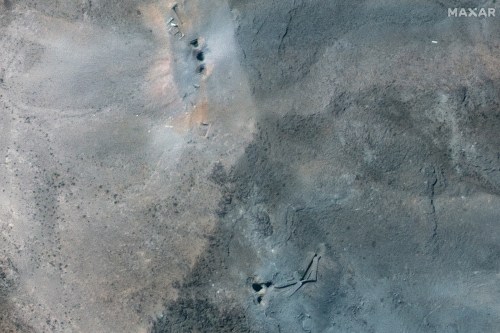“Midnight Hammer: The U.S. Airstrike on Iran and Its Global Consequences”

Sure! Here’s a long, well-structured English article about the recent U.S. airstrike on Iran, covering the background, events, and possible consequences.
🇺🇸 The U.S. Strike on Iran – A Dangerous New Phase in Middle East Tensions
Introduction
On the night of June 21–22, 2025, the United States launched a series of coordinated airstrikes on Iran, targeting key nuclear facilities in Fordow, Natanz, and Isfahan. The attack, authorized by former President Donald Trump during his ongoing campaign for re-election, marks the most direct American military action against Iran in decades. This operation, dubbed “Midnight Hammer”, has sent shockwaves through the global community and reignited fears of a regional war.
Background: Why Did the U.S. Strike Iran?
Tensions between the United States and Iran have been rising over the last few months, especially after a series of Iranian advances in its nuclear program. According to U.S. and Israeli intelligence, Iran was reportedly weeks away from producing enough enriched uranium for a nuclear weapon. Diplomatic talks in Vienna had stalled, and several Iranian missile tests had alarmed neighboring countries.
In addition to nuclear concerns, Iranian-backed militias had increased their attacks on American forces in Iraq and Syria. There were also reports of cyberattacks against Western infrastructure linked to Tehran.
The Airstrike: What Happened?
In a sudden and dramatic move, the U.S. Air Force, using B-2 stealth bombers and submarine-launched Tomahawk missiles, attacked three nuclear-related sites in Iran. According to Pentagon officials:
- The strikes were designed to be precise and limited, targeting facilities believed to be part of Iran’s most advanced nuclear enrichment operations.
- The bombs used included GBU-57 “bunker busters”, meant to destroy fortified underground structures.
Former President Trump announced the operation via a video message, calling it a “preventive action” and warning that “more strikes will follow if Iran does not surrender its nuclear ambitions.”
Iran’s Response
Iranian officials acknowledged damage to the facilities but claimed that their nuclear material and key scientists had been relocated prior to the attack. The Iranian Revolutionary Guard Corps (IRGC) issued a stern warning, stating that the U.S. would face “strategic retaliation at a time of Iran’s choosing.”
The Iranian Parliament held an emergency session and voted to shut down the Strait of Hormuz, a move that could significantly disrupt global oil supplies. Protests erupted in Tehran, while anti-U.S. sentiment spiked across the region.
Global Reactions
Support and Celebration
- Israel welcomed the strike, calling it “historic” and stating that it had been in full coordination with U.S. forces.
- Some Gulf countries, such as Saudi Arabia and the UAE, were silent but reportedly increased alert levels.
Concern and Criticism
- European nations (Germany, France, and the UK) expressed deep concern, urging both sides to de-escalate and return to diplomacy.
- Russia and China condemned the strike, calling it “illegal, provocative, and dangerous.”
- The United Nations Security Council held an emergency meeting and warned that the situation could spiral into a broader regional war.
Domestic Reaction in the U.S.
The strike became an immediate political flashpoint:
- Trump supporters hailed it as a show of strength and a defense of American interests.
- Critics, including many Democrats and constitutional scholars, argued that Trump had violated the War Powers Resolution by launching the attack without congressional approval.
Many Americans also feared military escalation, potential retaliation on U.S. embassies abroad, or attacks on American soil.
Possible Consequences
- Escalation of Conflict
If Iran retaliates militarily, a broader war could break out involving Israel, Gulf countries, and possibly NATO allies. - Oil and Economic Shocks
The closing of the Strait of Hormuz threatens a massive spike in oil prices, potentially triggering inflation worldwide. - Collapse of Diplomacy
Years of delicate negotiations with Iran over its nuclear program could be undone, pushing the region into a long-term cycle of violence and mistrust. - Cyber Warfare
Iran may increase its cyber operations against Western infrastructure in response to the attack.
Conclusion
The U.S. airstrike on Iran is one of the most significant military events of the 21st century, signaling a dangerous shift in the balance of power in the Middle East. While the U.S. government claims it acted to prevent a nuclear crisis, the operation has escalated tensions, strained international alliances, and put millions at risk.
Only time will tell if this bold move will achieve security—or spark a wider war.

Visitor comments ( 0 )